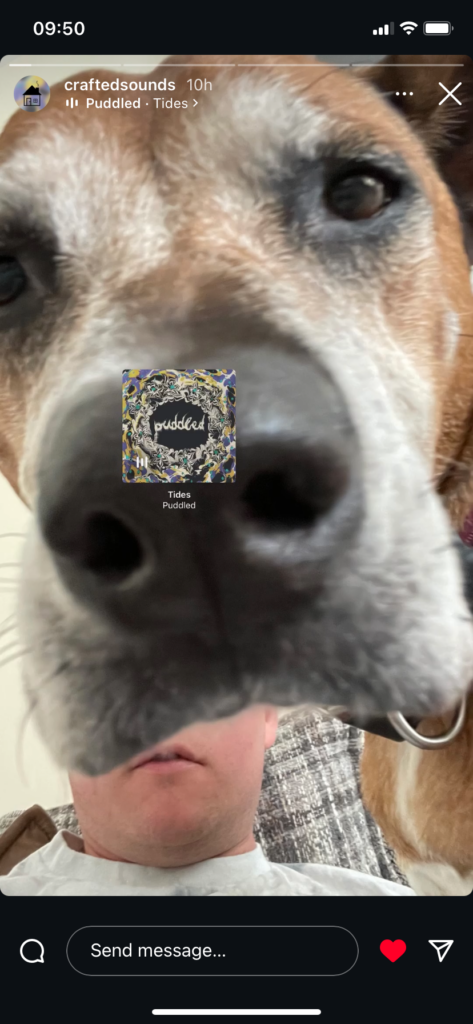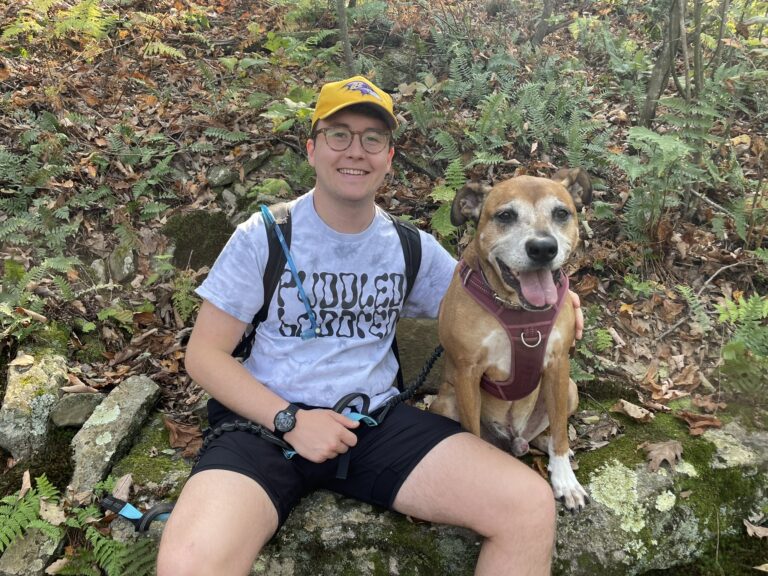By Carolina Carmo and Max Cohen
All photos provided by Connor Murray
The bands on the indie cassette label Crafted Sounds make scuzzy rock songs that often end before the two minute mark. “Oh Wonder” from Gaadge’s Somewhere Down Below is basically one idea—a three note riff that loops the entire time—executed perfectly. You have to listen to it 10 times in a row to be ready to move on. A Country Western opens Life on the Lawn with “Great is the Grip of the Hawk,” matching a thick low end with a whirring, round melody reminiscent of early Wednesday. And from the latest Crafted Sounds release, Puddled’s “Smn Good” is a reverby grunge number that smoothly flips in and out of half-time. Brevity isn’t the only thing these songs have in common—they all lean into a mysterious vocal sound, either obscuring them with effects, turning them way down or writing words that are purposefully hard to latch onto. The short non-sequitur lyrics read like haikus. All of this makes the Crafted Sounds roster feel cohesive: a seedy, refreshing, underground united front.
Unlike his bands, label-head Connor Murray is more than willing to tell you what he means. He parses through questions extensively with an impassioned monotone, often pausing before completing a thought. He’s got a lot to share considering he’s been running the label since he was 18.
Murray started Crafted Sounds in his parents’ house just outside Annapolis, MD. Headquarters then moved to Pittsburgh, while he was in undergrad at University of Pittsburgh, then to D.C., where he moved after graduation. Having grown up alongside the label, Murray remembers where he was when each of his releases dropped. When poked about it afterwards over email, he described a handful of the “random moments,” like getting the email pitch for High Sunn’s Flower Funeral on his prom night; getting late masters from The Zells’ Failure to Slide while he was studying abroad in Berlin and having to learn how to plan distribution for the release; receiving an email from Wildhoney about a tour tape one night while “chillin harddd” with friends: “I was a big Wildhoney fan in highschool. Felt seen.”
An important memory was the release show for the Bridges tape, a compilation of Pittsburgh bands accompanied by a dispo-cam photo zine. He turned 21 at midnight in Pittsburgh’s Spirit Hall, throwing back pickle shots with Flower Crown. The resulting press from the comp gave a huge lift to the label– “I remember meeting my girlfriend around this time and working late on this shitty $20 amazon desk while she slept in my bed like 5 ft away. When Bandcamp wrote about us I remember calling her crying because she had seen all the work I had put in.”
This summer Murray, now 26, and his girlfriend moved to Harrisburg, PA. We talked about how he continues to run Crafted Sounds between rained out camping trips and his full-time IT job, why you’d make cassettes in the first place and maybe the most brilliant band to come out of his era of Pittsburgh DIY, feeble little horse. Sometimes Murray’s got an almost pessimistic slant but he’s not jaded. Note the belief he has in the burgeoning Harrisburg scene. He may be a glass half empty guy but he mostly seems pleased just to have something to drink at all.
This interview aired on WRGW’s “Taking Notes” on Oct. 1, 2024 and has been edited for length and clarity.

WRGW: Connor, can you introduce yourself?
CM: My name’s Connor, I run Crafted Sounds, an independent record label based in Pennsylvania. Started at my parents’ house in the Annapolis area, brought to Pittsburgh kind of rooted in Pittsburgh from there. It’s been headquartered in D.C. and now back in Pennsylvania. It’s a hobbyist endeavor based on being in the business of breaking even and doing cool shit. Does that work? Hahaha.
First thing we wanted to ask you is, why tapes and do you listen to them?
I’d say in the early 2010s to mid 2010s, obviously the vinyl resurgence was very much in. But I feel like vinyl was more expensive then relatively for independent acts than it is today. I think there’s been a couple more plants that have popped up in the past 10 years, which kind of evened out the market a little bit and helped with demand as that’s continued to grow. But tapes were definitely cheaper then, I can definitely account to that. I think back then you could sell, in 2015 or so, you could sell tape for $5 and still operate where you were not necessarily profiting, but had money to make more if you wanted to, or helped you get shirts printed which could sell for better margins, or whatever the case may be.
I think for somebody looking to get into physical media CDs were, at that time, not as interesting. I think CDs are coming back, and we can talk about that later. But tapes were cheap. Tapes were cool as far as how you can customize them and put art into them, whether it’s on the shell or in the J-card. And a lot of my favorite labels that influenced me were big on the tape format. So kind of an easy decision for someone who had, like, virtually no budget for starting a label to dive into tapes and try to grow within that niche.
But as far as listening to them…I mean when my grandfather passed away, I did take a lot of his sound equipment. There was a tape deck. It wasn’t great. I think I actually got rid of it and ended up getting a model that was very similar to it to match the receiver that I had. I don’t listen to a Walkman or something like that. That’s a great place to start for somebody who’s into that, there’s many different options.
You said back in the day you could sell a tape for five bucks and break even. Not the case anymore?
No. The tape we just did for Puddled, it had all the extra bells and whistles, but unit cost for manufacturing a short run, like, really small run, was closer to $5. But that’s like, worst case scenario. I’d have to look at recent quotes I’ve done for runs of 100 or more. You don’t see people selling tapes online for $5 anymore. It’s kind of around $10 and that sucks. I feel like CDs are helping us break even or recoup on the sunk costs of tapes. Not that I have a crazy amount of inventory. It’s just everything’s gotten more expensive all the way down to tapes.
I remember in the pandemic people in catering and hospitality complaining about how much a jar of mayonnaise was. Obviously, things have tapered off, but inflation is definitely real. It was a good time to get started then.
I saw your Instagram story the other day that you’re going to spend label funds on buying a tractor. That’s awesome, speak on that.
We went away this weekend, and we were in Everett, Pennsylvania, in the middle of nowhere. Basically, our camping trip got rained out, so I got an Airbnb for a bunch of friends. And it was late in the night, and it’s always fun going on YouTube at somebody else’s place or like a rental, because you never know. I would say this particular YouTube feed was very strangely conservative, given that it was very much in the center of Pennsylvania. But they had Mecum auto auctions, exclusively for tractors. So it was 2 a.m. and we were watching that…I’ll just leave it there.

So what about the Pittsburgh scene drew you into the label business? What made you want to be a part of it?
I went to Pitt for undergrad. I didn’t go to grad, haha I don’t even know why I called it undergrad. But I went to school in Pittsburgh. I started my label my last semester of high school, through mutual friends. But I think early on, I wanted to be a part of something in real life. I don’t really like the idea of just being an internet person. Not to necessarily be a physical presence, but just to go to the same venue or same bar, run into some of the same people and say hello, and have a sense of community, for myself at least.
And as I’ve gotten older that’s gotten a little bit more important, because your social circle kind of gets smaller after college. You know, life happens. But growing up I wasn’t old enough to be a part of certain environments in Baltimore. There were certain artists and certain venues, like The Crown for example, I wasn’t old enough to go to. And there were a lot of artists that I was finding on Bandcamp that I was a huge fan of, but I just never got to experience. And I think that fantasy of what that would have been like, or what I thought that was in my head, is something I wanted to put on display through what I did in Pittsburgh. So right when I got there my friend Ryan, who was part of WPTS, introduced me to the radio station, and then started taking me to different house shows and whatnot. I worked with his band early on, and just started making those relationships.
And I think in many ways I was spoiled. As you guys know, being in Baltimore, being in D.C., it’s a national scene. You get whatever you want, everybody comes through there. Locally, it’s very talented, at least at the time. Like in the 2010s you have Future Islands, Beach House, Lower Dens, Dan Deacon, that whole elder millennial core. And you have Sister Polygon and DZ Tapes in D.C., not to mention Dischord.
And you know, that’s all great, but coming to Pittsburgh in 2016, it was kind of in a weird spot. I think every scene kind of goes through peaks and troughs, you know. The barrier to entry was low as far as like, if you wanted to be anybody trying to do anything there. Especially in a smaller city that has less of a national pool, because those cities rely more on local acts to draw national attention, especially because the national acts likely aren’t coming through with a supporting band or supporting artist.
Now, I’d be lying if I said I thought about it this much when I started. I just kind of started meeting people when I was partying and whatnot. It was…it felt kind of bleak at first. There wasn’t a national band from Pittsburgh where it was like, “oh, feeble little horse,” or Merce Lemon, or Gaadge. Like that did not exist. Not to say there weren’t great bands coming from Pittsburgh at the time. It just wasn’t thought of like Philadelphia. People probably thought of Columbus or Cleveland before they thought of artists in Pittsburgh. I mean, I could be mistaken, and I’m sure one of my friends will correct me but as far as national spotlight or regional spotlight is concerned it was a little different. Even living in Harrisburg now, I just wanted to make the most of what was around me and see where it went. There’s a lot to be said about a lot of small scenes, it just takes a certain type of spotlight and a certain type of attention and passion that people are interested in. If you just are persistent in saying “this is sick,” somebody will probably listen. I think organically, Pittsburgh then had a lot going for it, there were a lot of people there at the right time. I was just another piece of that.
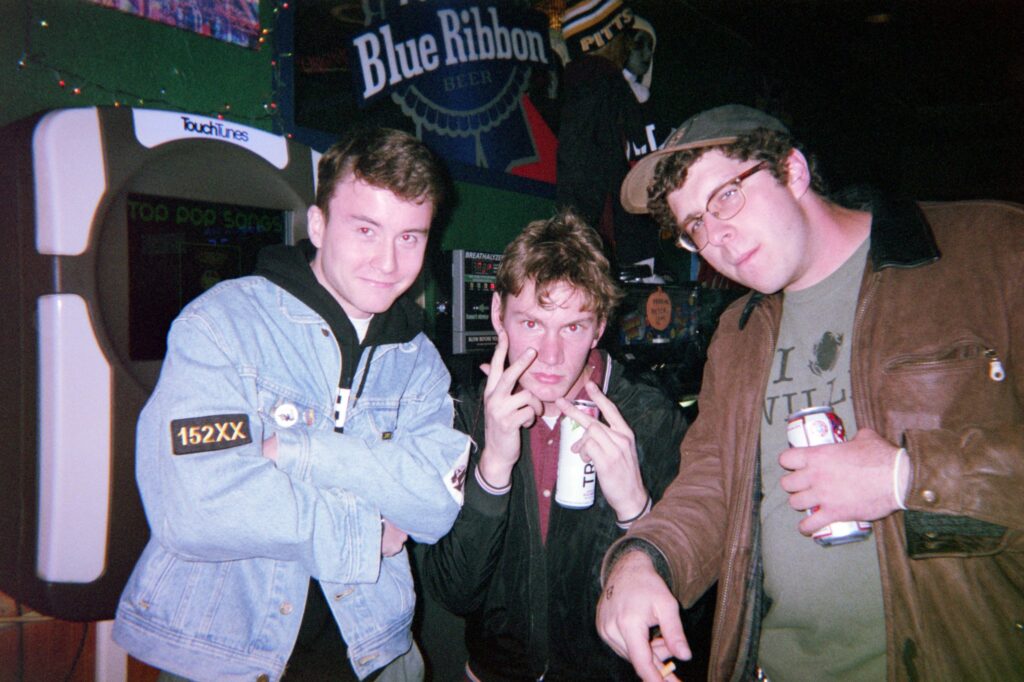
Does it feel different to be so connected to a scene after it’s gotten the spotlight on it? How does that change things?
Doesn’t change a whole lot. It’s more exciting. I definitely have a lot more friends and connections and stuff going back now. I’d say a lot of bands I worked with that are still doing the thing are not playing in basements as much as they were then. Everybody I worked with kind of graduated to playing bigger venues and touring and that’s great. Myself and all those artists, most of which, you know, are much older than me, kind of all graduated at the same time.
There’s certain bands that I’m listening to now in Pittsburgh that make me excited. I’m always curious, like, what does the next generation look like, and how can we foster that? But at the same time, I’m not necessarily only working with people from Pittsburgh. It’s definitely HQ, I think that community is important, and I’d love to move back there, just for the sake of cost of living at some point. But at least people are touring through there now, I feel like that’s changed a lot.
I totally feel that. I went to high school in Pittsburgh, and I only learned that the scene was cool after I left. I only came to know about feeble little horse, for example, way into college, or maybe during the pandemic, but actually listening to them in college. And it’s like, Pittsburgh W, but I wasn’t there to experience it.
And that’s a very one off case, because that, I can’t explain that trajectory, even being a part of that. Some music’s just good.
But I feel like a lot of stuff in that feeble little horse sound is happening all over the place. Daffo is a rising artist that definitely plays with the bit-crushed shoegaze thing. That specific sound is having a moment.
Yeah, it’s definitely very buzzy. And I get a lot of demos right now, they’re like, “We love feeble little horse!” Like, same dude, you know?
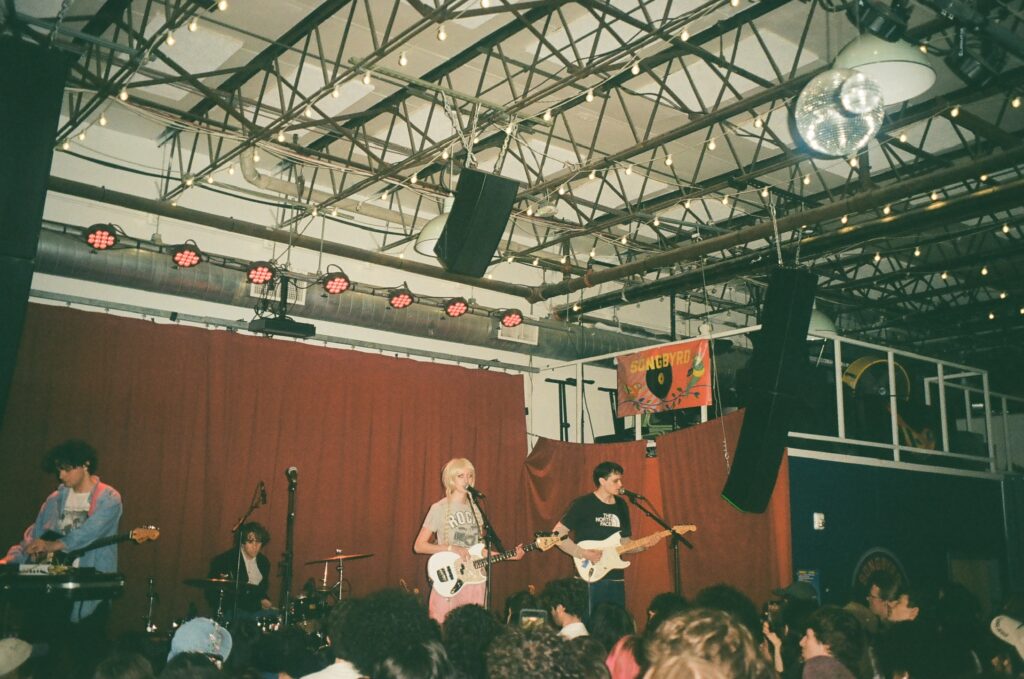
Speaking of demos, how do you go about scouting talent? How do you pick that something different in a band?
Loaded question. I think my response changes every time. At this point there’s a lot of bands kind of in the universe of the label. Not in the sense that we work with every band in that universe, but either I book a show or a band that I work with played a show with someone, and number one, they’re kind of good people. Not that you have to be a certain way in a live setting, but they’re approachable and, for whatever reason, either struck a chord with me or the band. I think when you’re working a full-time job, at least for my sake, understanding that somebody has some kind of grace or understanding about them, and being in touch with other people, it’s just such a big thing.
Obviously that’s something that I try to look into after hearing the music. But I operate release to release, I don’t have contracts right now. I’m, like, in a lot of student debt, I’m just trying to knock that out. I’m not going to sign somebody for a four record deal and be like, “I’m going to rob you of your 20s or your most creative years of your music career.” I have no weight in that type of game.
So, like, obviously the music’s good. Whether I see it in person, which I prefer to if possible, or if there’s a good demo that definitely opens the door. But then also talking to the bands I work with, and being like, “hey, what was your experience with them when you played with them at the show?” Or “what do you know about them?” Or were they in other bands before? Like, let me listen to some of those bands. It’s kind of a rabbit hole, in the same way that I was discovering music in high school. Just going down Bandcamp figuring out, like, “Okay, this member’s from this band, they used to play five years ago, and I remember that album that was sick.” I will say, just because somebody sounds like a certain band doesn’t mean that I’m all over it. Especially if I’ve already worked with them. Like, we work with BRNDA, who’s very different from A Country Western, who’s very different from Gaadge. They all exist in the same universe, and they’re all very chill in different ways, which is, like, such a subjective qualifier. But I think there’s something about how I approach music where I want all the artists to sound different. If I wanted to be a shoegaze label, I would be, you know, but other people want to do that and that’s good, I think that’s healthy. That’s just my preference.
It sounds like your creative partnership with artists is very hands off, and you kind of allow them to do whatever they want.
Yeah, I mean, generally speaking. Like I said, I’m operating very bare bones. I don’t have a budget to go, “here’s $10,000 to go pay for part of your next record.” I think in many cases $10,000, it’s not enough to pay for a record. I think that type of thing needs to be talked about more. That’s a whole other conversation.
A lot of times artists come to me with masters, if they’re in the early mixing phase, or they’re recording, and they want to know what I think, especially when we already have a working relationship. We’ll talk through that, but I don’t have any musical skill or stripes, so I’m not gonna go and say, “Hey, do this thing.” I’ll definitely give recommendations, like track ordering or track listing, if that’s something we want to talk about. Just from working with different releases and understanding how albums flow from a very subjective point of view, just from listening to a lot of music. I trust artists to be themselves. I don’t want to mess that up. I’m interested in working with them, so I want them to be them, you know. But if I was, like, a beast and had all this mixing and mastering capability, and was a producer, sure, I’d be more hands on. But that’s just not my jam.
You’re kind of an enigma in that way. At this point, most everyone I’ve talked to in the music industry is always saying you got to wear a million hats, so many people know how to produce or know how to mix…
I mean, if I found a way to add extra days in the week, I would totally pick up those skills. But, the many hats thing is for real. Whether it’s social media, whether it’s PR, whether it’s digital distribution, physical distribution…you kind of pick up those different notches over the years.
So Crafted Sounds is what, eight plus years old, almost 10. Double digits! How does that feel?
If we can do 10 more that would be sick. Obviously want to get to the first 10, but it’s definitely funny to look back on certain catalog items. Because I remember where I was in my life for each of the releases. And that might change as I get older and more time passes. But a lot of the first five years or so, I was in school. Pandemic hit. I was in Pittsburgh then moved to D.C. with my girlfriend. Then we’re here and we got a dog. And it looks like we might move again. My girlfriend’s finishing her Doctorate of audiology, and I’ve been progressing my career. Your responsibilities will change. And I’ve found ways to keep the label as a persistent, like, constant in my life, which is great. Whether that means I continue to kind of scale up in some ways, or whether it means I scale down, or I bring in somebody else…I think the biggest thing is just trying to be in touch with what gets me excited and not worrying necessarily about the money, as long as we’re breaking even. Because, especially living in the middle of nowhere, I’m trying to make the most of it, I’m getting connected with some people out here. Harrisburg’s time will come. I fully believe it. Good things are in the works. But it definitely makes you think about what drives you as a person. And I know that’s very deep and very existential, but when your life slows down, and you know no one, you ask yourself, “why do you do what you do?” So as long as it’s so interesting, the music’s still good, we’ll keep going.
Are you working another full time gig also?
Oh, yeah. I can’t live off this, nor can my artists at this scale. I work for a large health company based in Pittsburgh. I work in IT, I lead a software development team. Not very sexy, but, you know, takes care of things.
But making tapes is very sexy, so at least you have a dichotomy.
I went to business school, but I also studied Information Systems. I understand how databases work, I understand different programming languages, generally speaking. And I know how to work with people, obviously. I think I learned a lot of that through the label, honestly, that helped me professionally. But building my website, for example, if I hadn’t had the IT experience, I probably wouldn’t have been so gung ho on that. In another universe I would have gone to Belmont for music business and I didn’t, so that’s something to ponder about sometimes.
So Pittsburgh’s home base, you were trying to expand in D.C. There’s a couple bands on your label that are in D.C. Do you feel good about how much you’ve expanded into Baltimore and D.C.?
Yeah, I think Baltimore especially that whatever moment was happening in the 2010s was very exciting to me, and to work with some people who participated in that is really cool. At least for the 18-year-old version of myself, I think just to have some kind of mid-Atlantic presence, whether it’s in Pittsburgh, whether it’s D.C./Baltimore, we got a band in Vancouver now. It’s cool just to know that bands, if they really wanted to, or they’re in a pinch, they can reach out to another band and help get a show. That’s been really cool to see. Also, as people move and stuff, like that one band Buddie that was in Philadelphia that moved to Vancouver, or Puddled has members in Philadelphia and Baltimore. Aunt Katrina now has members in D.C. and Baltimore. Those are all places I frequent so it’s just nice to be able to catch people for a split second on that personal level.
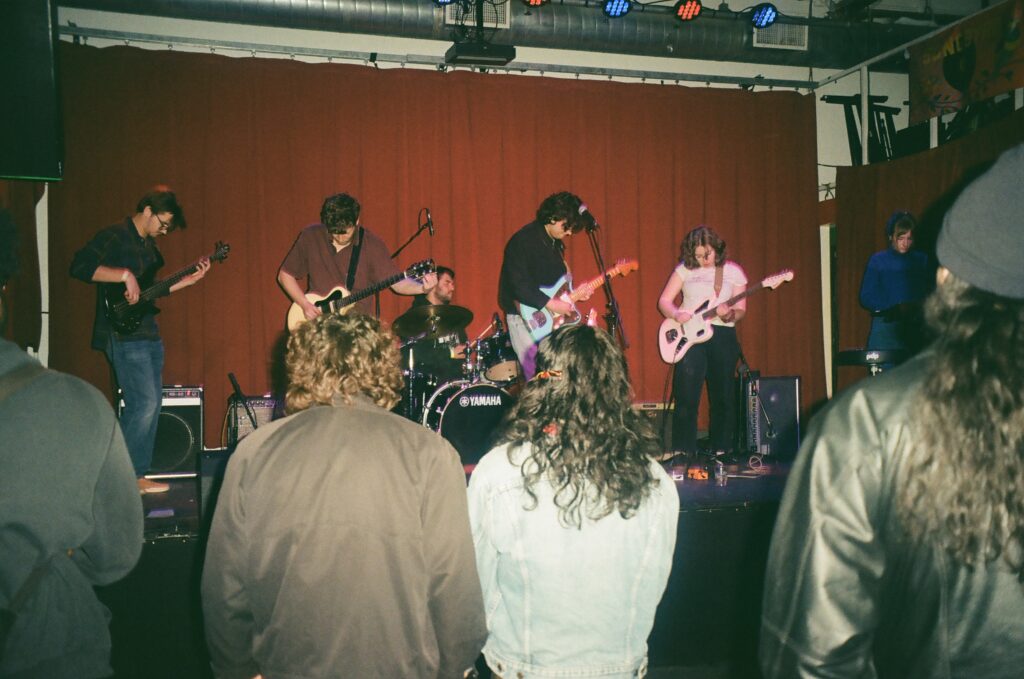
Do you notice any key differences between the Pittsburgh and D.C./Baltimore scene?
I feel like the D.C. scene today is a lot smaller than the Pittsburgh scene. Not in the sense that there’s less people in D.C., because there’s definitely more. It’s nearly double in population to Pittsburgh. But I just feel like the local scene is much more fragmented. The D.C. culture is very standoffish, and I hate it. I think there was a time, too, where certain bands took more of an elitist stance, or like a “too cool” or whatever stance, and that happens in different areas of the country, regardless where you are. But I felt like bands or people in bands at the same place, at the same time, weren’t talking to each other in the same way people in Pittsburgh were. So you could say Pittsburgh is warmer and more vibrant in terms of local bands working with each other, or playing the same bills together, or building up certain things. Not to say that doesn’t exist in D.C., because I think there’s a lot of community in that sense. I just felt like Pittsburgh had more of that. I’m sure Ray Brown or somebody will come out of a bush and punch me, but like, that was my observation.
Now, Baltimore, I feel like they’ve had turnover in venues a little bit. I feel like they’re kind of in a rebuilding phase. There are a bunch of cool bands right now, though. I mean, Aunt Katrina, Ryan just moved over there, Puddled, and I really like Powerwasher out there. Baltimore drew me to Pittsburgh in the sense that it was kind of like, in some ways, post-industrial, kind of down to earth people, friendly people. There’s people in Baltimore that I met years ago that I’m still in touch with. And Baltimore, definitely, relies on their local acts more than D.C., in a similar way of Pittsburgh. Baltimore still gets better shows than Pittsburgh from time to time, I think that honestly might be changing a little bit. But yeah, that’s my general observation. I’m sure that will piss somebody off.
I feel similarly. I understand the hedging of what you’re saying, but also feel that as somebody who gigs in D.C.
I mean, the venues are great in D.C. Like I will say that. I lived very close to Pie Shop, so I could walk there. That was probably my favorite spot. And I mean, I went to a lot of those venues in high school, but going to Rhizome for the first time was really cool. You know, seeing This is Lorelei at Rhizome was really crazy. Tosser’s early shows at Rhizome. Like that kind of took me back to college, a little bit, like what shows were like pre-pandemic, at least for me. I hadn’t been at a house show since college. And I’ve been four years removed from college now, or something like that.
So you’ve done a couple compilations in Pittsburgh. Specifically, the Bridges tape is awesome. Do you think that the warmth of Pittsburgh facilitates a compilation like that nicely? Or do you think that some of the warmth and collaboration is fostered by people like you and projects like that?
I think it’s really just a testament to the people, like, right place, right time. Obviously, I’m in a certain position like this, certain people might be nice to me because of whatever reason. But I think honestly there’s just a lot of nice, talented people in Pittsburgh.
When I had the idea to do that, at least the second time, people were very willing to contribute and be a part of that. I will say compilations are a lot of work so I don’t know when I’ll do the next one, but the first compilation was kind of the make-or-break for the label early on, and helped me meet a lot of people. I think for any label starting out, doing a compilation is a great way to meet people, raise money for either your own cause or your organization, and put bands on that maybe didn’t have a spotlight. That first one I did was my freshman year college, and we raised like $1,000 for Planned Parenthood, in just a couple house shows or whatever. Making the compilation’s more of a happening rather than, like, here’s a bunch of songs. That was definitely fruitful for the label in those two instances, especially the second time, because Bandcamp Editorial picked it up and that was a big shift. You can see our sales really stagnate, and then in 2019, we just took a jump from that point on, which is really crazy.
Ever think about doing a D.C. comp?
It’s hard to say, like…I don’t really want to insert myself in a bunch of different cities. I don’t live there now, and I don’t think I necessarily owe it to anybody to do that. I think there’s people who are more integral to that scene than I that should take that, and I don’t want to do any disrespect or oversee anything. I just feel like it wouldn’t be the right place for me unless I lived there much longer, but I feel like I was more so on the sideline when I lived there.
I loved the fact that with the comp tape, and the zine that went along with it, just the sense of community you feel. That you got all Pittsburgh people to do all of that, it’s really inspiring stuff.
I encourage anybody to do that type of shit. Everybody else executed, you know. I just bought a bunch of things. So yeah, appreciate it.
Connor, thank you so much. Anything you want to plug?
Listen to Puddled. We have a Buddie single coming out and A Country Western going on tour. Listen to music, buy music, that’s all I really have to say.
